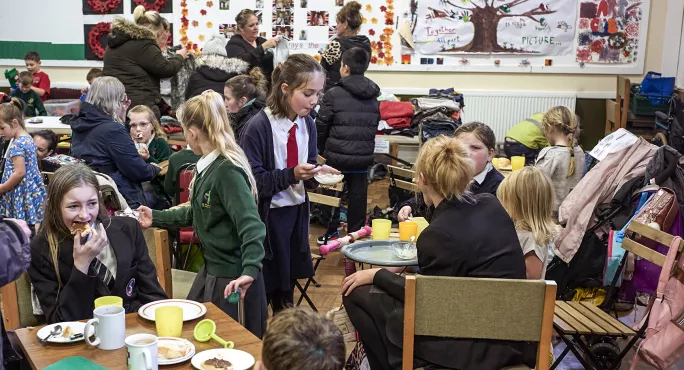Primary school staff estimate that nearly half of all pupils (48 per cent) have experienced hardship at some point in the school year, according to a survey by the Joseph Rowntree Foundation anti-poverty charity.
For staff at primary schools in more deprived areas, the estimate increased to 59 per cent of pupils.
Furthermore, around two-thirds of staff said they have seen a substantial increase in pupils coming to school hungry or tired over the past two years.
As a result, a third of survey respondents said their school now offers a food bank, while 57 per cent said their school offers free or subsidised food (outside of free school meals).
Almost 40 per cent of staff also said they were providing support for pupils and families out of their own pocket.
Schools supporting pupils in poverty
This echoes a recent report that schools are now the biggest source of food aid for families and research by the National Foundation for Educational Research in which a third of primary school teachers reported that more pupils are regularly coming to school hungry compared with last year.
Three-quarters of primary school staff told the Joseph Rowntree Foundation (JRF) that the hardship pupils are experiencing makes it harder for them to do their job well, while 60 per cent said it left them feeling increasingly under pressure at work.
One deputy head in Bristol told researchers that the scale of the challenge of supporting pupils in poverty was often overwhelming: ”You feed them, you clothe them, you tell them where to go if they’re homeless. It’s literally everything.
“It’s not even about teaching or learning. It’s about keeping them fed, keeping a roof over their head. School has never had to do so much of that as they do now.”
Staff also told researchers that their schools have had to cut back on things like enrichment activities, school trips or even learning resources because they are supporting children facing hardship.
Commenting on the findings, Katie Schmuecker, principal policy adviser for the JRF, said it was clear that any future government would have to address the issue of poverty, given the scale of the problem.
“No plan for our schools or NHS should be taken seriously if it doesn’t include tackling hardship,” she said.
“Primary schools are staggering under the weight of hardship - it shouldn’t fall to them to ensure that families are not going hungry.”
JRF surveyed 515 primary school staff and undertook qualitative research with 15 staff members working in schools in the 40 per cent most deprived areas in England and Scotland.
Most of those surveyed (338) were classroom teachers, though the sample also included senior leaders, teaching assistants and other school roles.
In response to the findings, Daniel Kebede, general secretary of the NEU teaching union, said the data was a “damning insight” into how “schools and their staff are increasingly bearing the weight of addressing poverty in society”.
He added: “This new research adds to a now substantial amount of evidence , which all tells the same story of schools having to deal with problems they are not equipped for.”
For the latest education news and analysis delivered directly to your inbox every weekday morning, sign up to the Tes Daily newsletter




